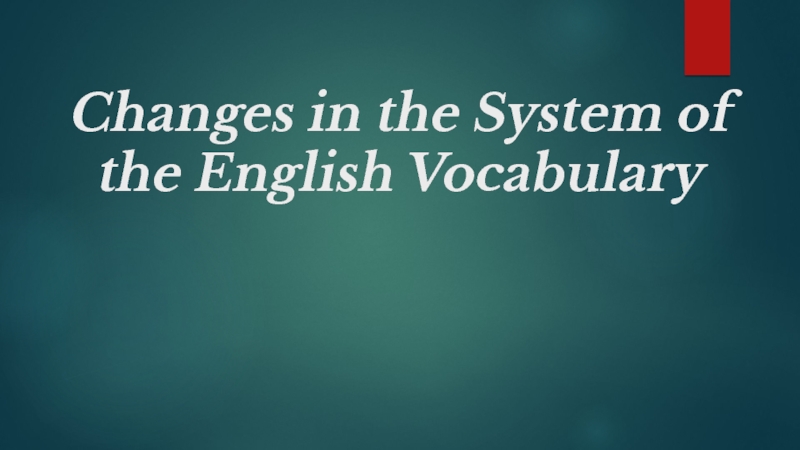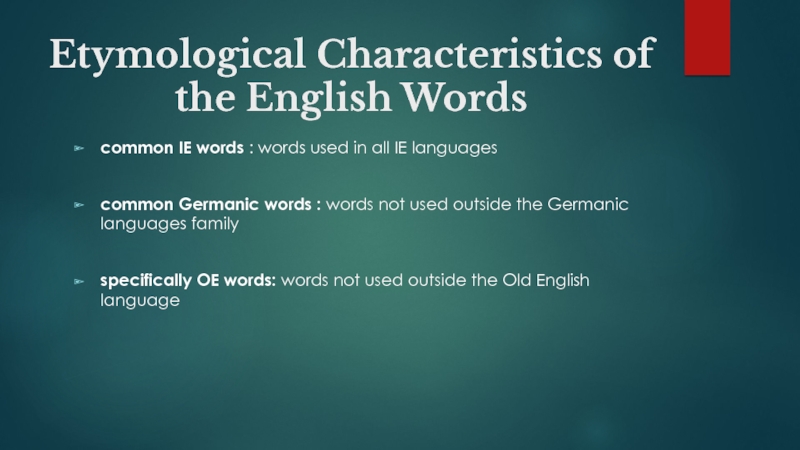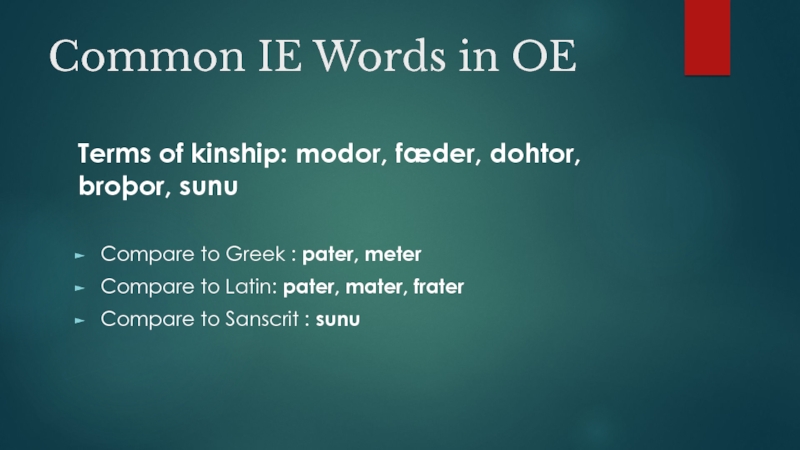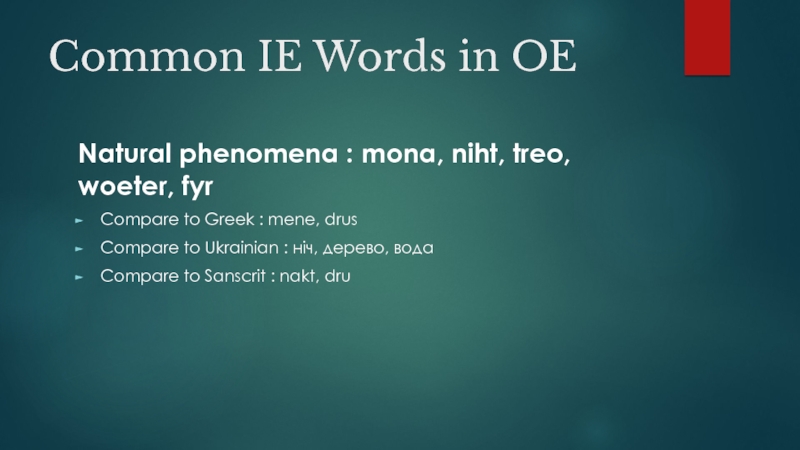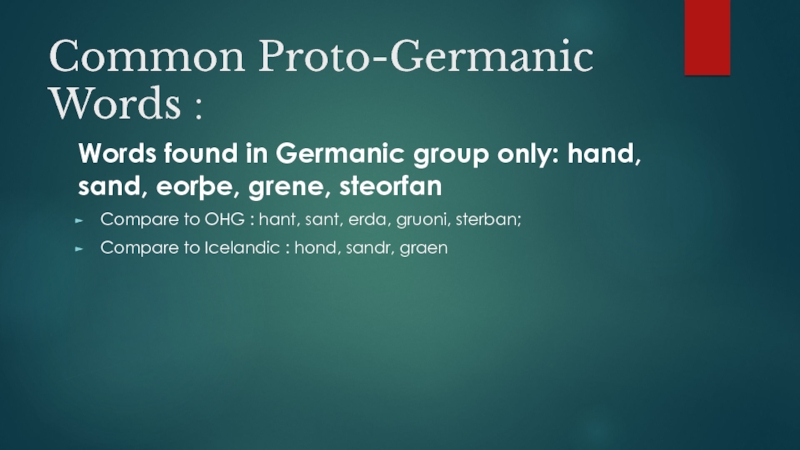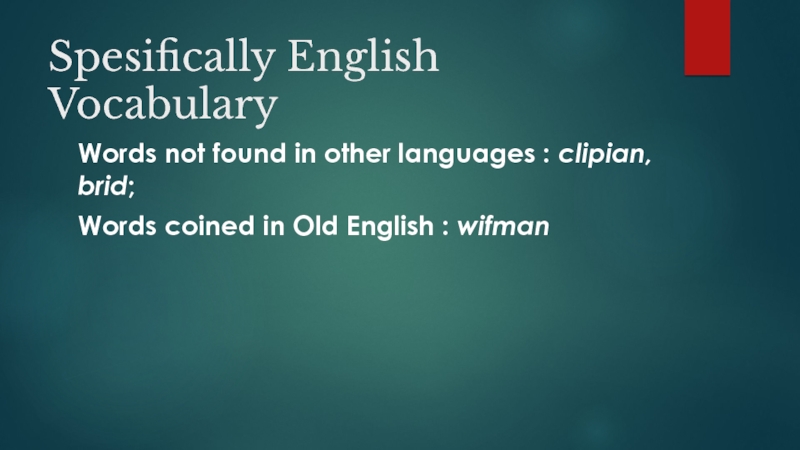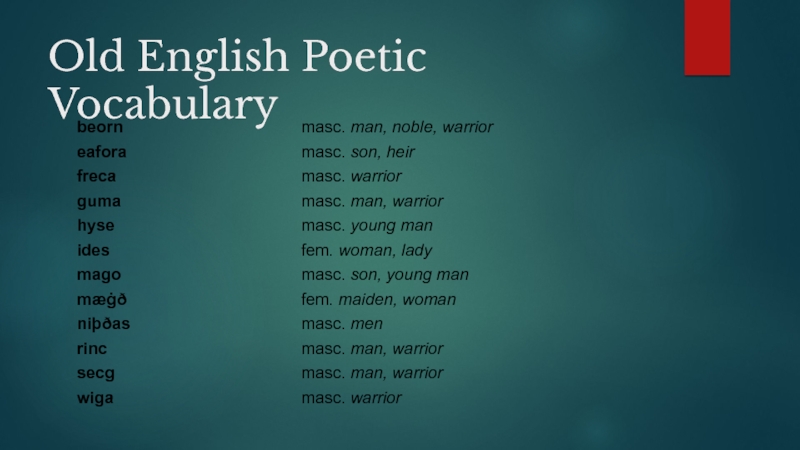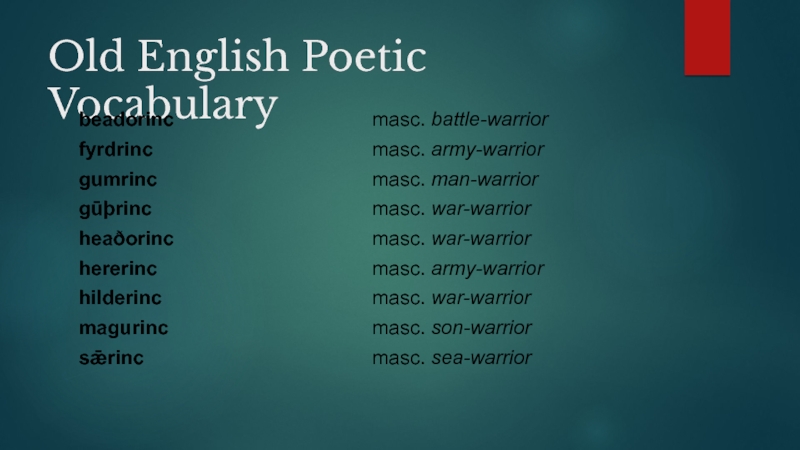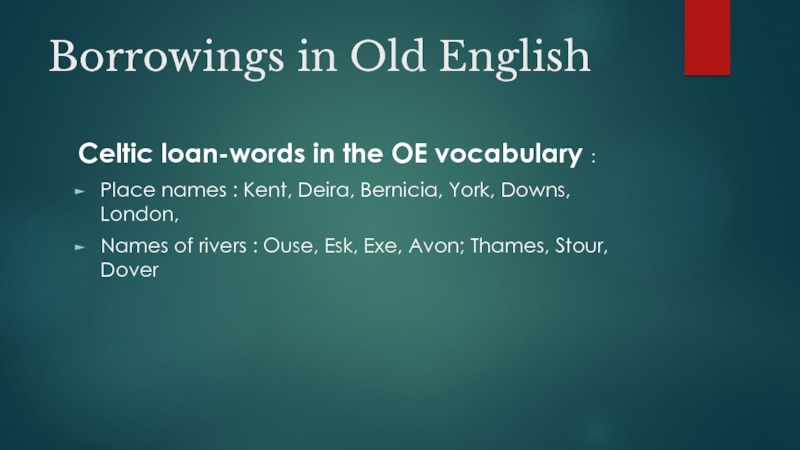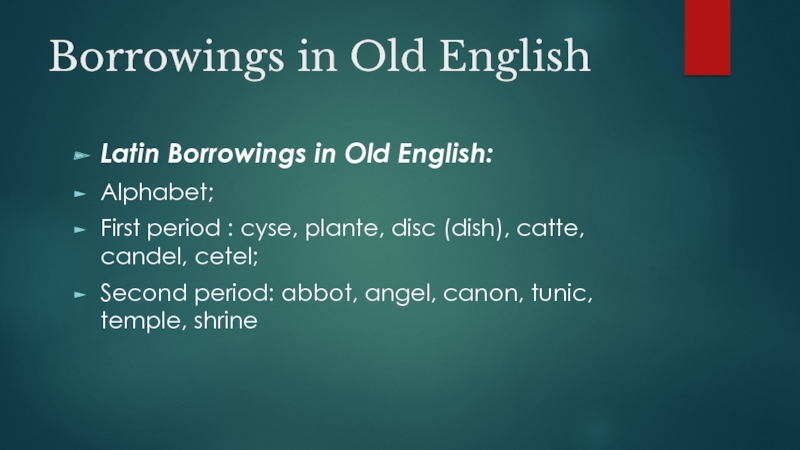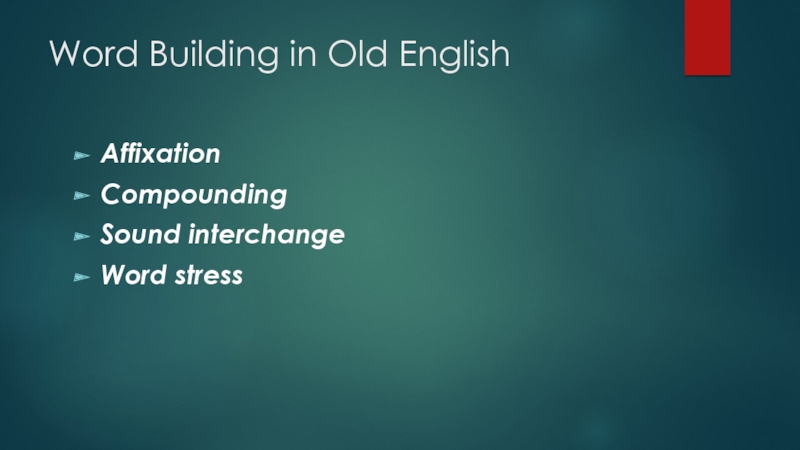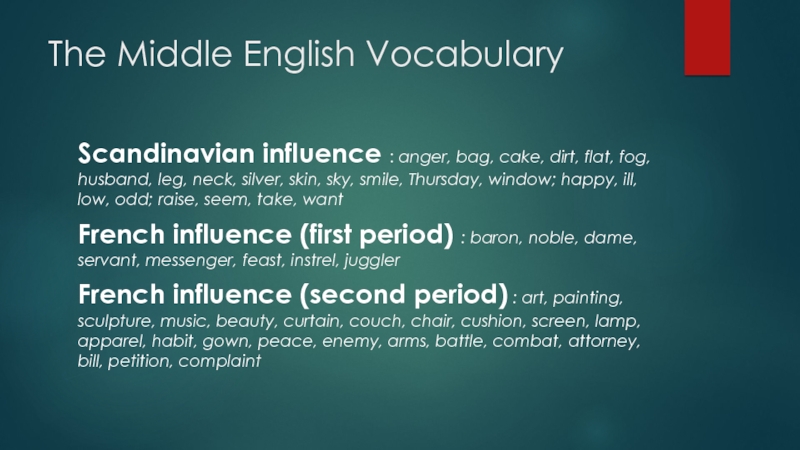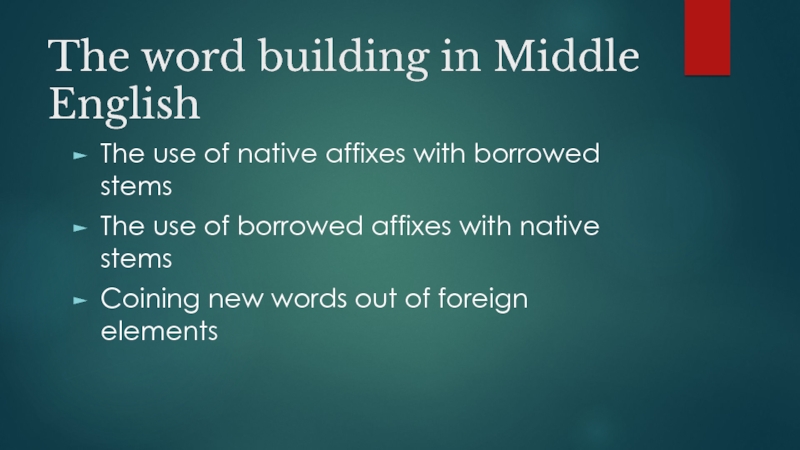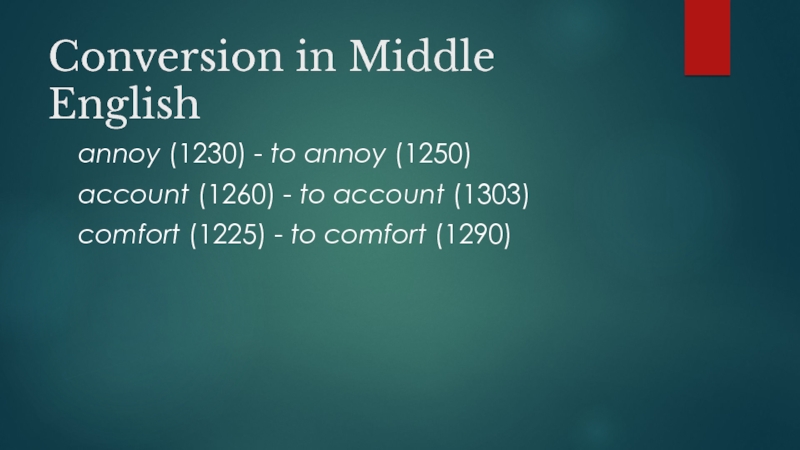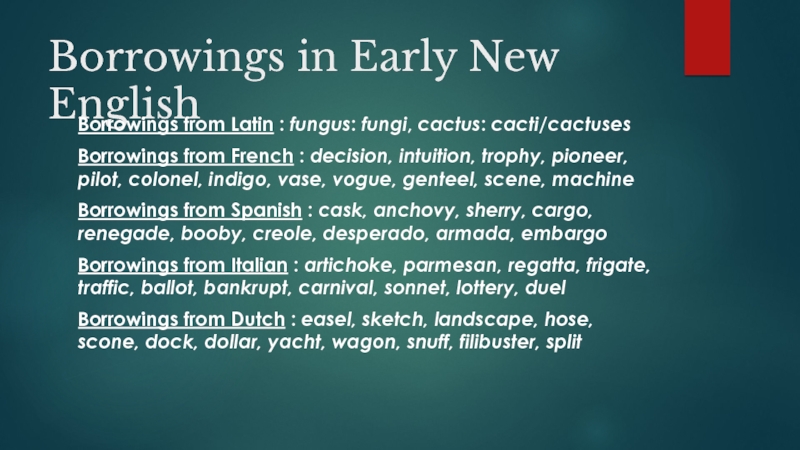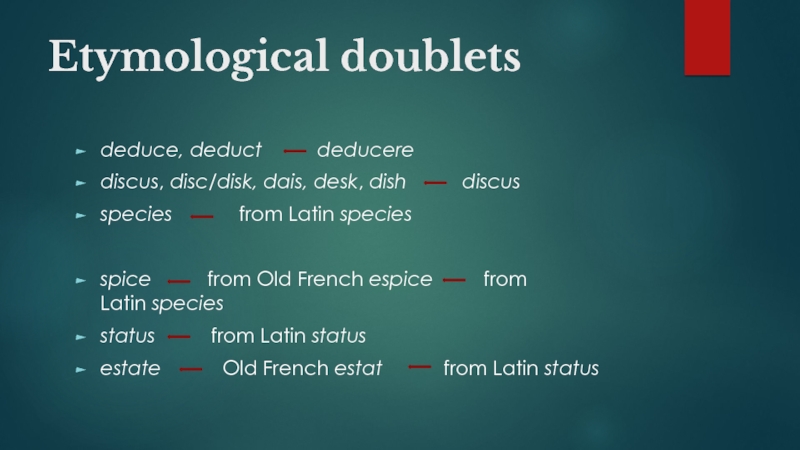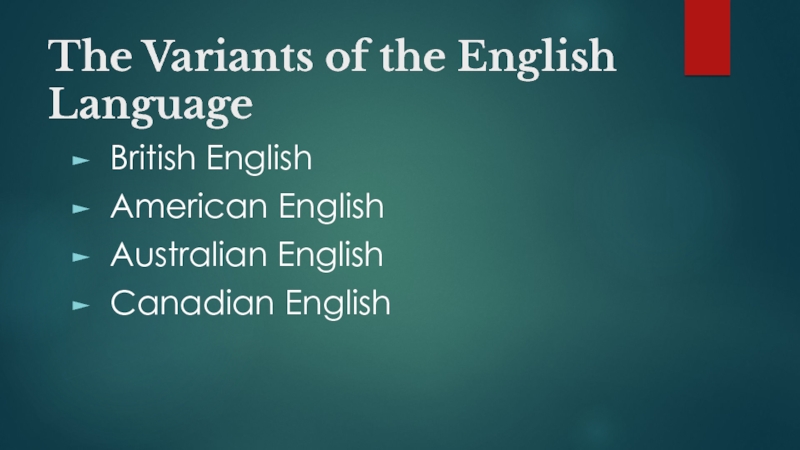- Главная
- Разное
- Дизайн
- Бизнес и предпринимательство
- Аналитика
- Образование
- Развлечения
- Красота и здоровье
- Финансы
- Государство
- Путешествия
- Спорт
- Недвижимость
- Армия
- Графика
- Культурология
- Еда и кулинария
- Лингвистика
- Английский язык
- Астрономия
- Алгебра
- Биология
- География
- Детские презентации
- Информатика
- История
- Литература
- Маркетинг
- Математика
- Медицина
- Менеджмент
- Музыка
- МХК
- Немецкий язык
- ОБЖ
- Обществознание
- Окружающий мир
- Педагогика
- Русский язык
- Технология
- Физика
- Философия
- Химия
- Шаблоны, картинки для презентаций
- Экология
- Экономика
- Юриспруденция
Changes in the system of the english vocabulary презентация
Содержание
- 1. Changes in the system of the english vocabulary
- 2. Etymological Characteristics of the English Words common
- 3. Common IE Words in OE Terms of
- 4. Common IE Words in OE Natural phenomena
- 5. Common Proto-Germanic Words : Words found in
- 6. Spesifically English Vocabulary Words not found in
- 7. Old English Poetic Vocabulary
- 8. Old English Poetic Vocabulary
- 9. Borrowings in Old English Celtic loan-words
- 10. Borrowings in Old English Latin Borrowings
- 11. Word Building in Old English Affixation Compounding Sound interchange Word stress
- 12. The Middle English Vocabulary Scandinavian influence :
- 13. The word building in Middle English
- 14. Conversion in Middle English annoy (1230) -
- 15. Conversion in Early New English Conversion from
- 16. Borrowings in Early New English Borrowings from
- 17. Etymological doublets deduce, deduct
- 18. The Variants of the English Language
Слайд 2Etymological Characteristics of the English Words
common IE words : words used
in all IE languages
common Germanic words : words not used outside the Germanic languages family
specifically OE words: words not used outside the Old English language
common Germanic words : words not used outside the Germanic languages family
specifically OE words: words not used outside the Old English language
Слайд 3Common IE Words in OE
Terms of kinship: modor, fæder, dohtor, broþor,
sunu
Compare to Greek : pater, meter
Compare to Latin: pater, mater, frater
Compare to Sanscrit : sunu
Compare to Greek : pater, meter
Compare to Latin: pater, mater, frater
Compare to Sanscrit : sunu
Слайд 4Common IE Words in OE
Natural phenomena : mona, niht, treo, woeter,
fyr
Compare to Greek : mene, drus
Compare to Ukrainian : ніч, дерево, вода
Compare to Sanscrit : nakt, dru
Compare to Greek : mene, drus
Compare to Ukrainian : ніч, дерево, вода
Compare to Sanscrit : nakt, dru
Слайд 5Common Proto-Germanic Words :
Words found in Germanic group only: hand, sand,
eorþe, grene, steorfan
Compare to OHG : hant, sant, erda, gruoni, sterban;
Compare to Icelandic : hond, sandr, graen
Compare to OHG : hant, sant, erda, gruoni, sterban;
Compare to Icelandic : hond, sandr, graen
Слайд 6Spesifically English Vocabulary
Words not found in other languages : clipian, brid;
Words
coined in Old English : wifman
Слайд 9Borrowings in Old English
Celtic loan-words in the OE vocabulary :
Place names : Kent, Deira, Bernicia, York, Downs, London,
Names of rivers : Ouse, Esk, Exe, Avon; Thames, Stour, Dover
Слайд 10Borrowings in Old English
Latin Borrowings in Old English:
Alphabet;
First period :
cyse, plante, disc (dish), catte, candel, cetel;
Second period: abbot, angel, canon, tunic, temple, shrine
Second period: abbot, angel, canon, tunic, temple, shrine
Слайд 12The Middle English Vocabulary
Scandinavian influence : anger, bag, cake, dirt, flat,
fog, husband, leg, neck, silver, skin, sky, smile, Thursday, window; happy, ill, low, odd; raise, seem, take, want
French influence (first period) : baron, noble, dame, servant, messenger, feast, instrel, juggler
French influence (second period) : art, painting, sculpture, music, beauty, curtain, couch, chair, cushion, screen, lamp, apparel, habit, gown, peace, enemy, arms, battle, combat, attorney, bill, petition, complaint
French influence (first period) : baron, noble, dame, servant, messenger, feast, instrel, juggler
French influence (second period) : art, painting, sculpture, music, beauty, curtain, couch, chair, cushion, screen, lamp, apparel, habit, gown, peace, enemy, arms, battle, combat, attorney, bill, petition, complaint
Слайд 13The word building in Middle English
The use of native affixes
with borrowed stems
The use of borrowed affixes with native stems
Coining new words out of foreign elements
The use of borrowed affixes with native stems
Coining new words out of foreign elements
Слайд 14Conversion in Middle English
annoy (1230) - to annoy (1250)
account (1260) -
to account (1303)
comfort (1225) - to comfort (1290)
comfort (1225) - to comfort (1290)
Слайд 15Conversion in Early New English
Conversion from verbs to nouns : contest,
grasp, push, scream, award, brew, convert, produce, stew, cheat, pry, sneak, bend, dip, lounge, goggles, rattle, spring
Conversion from nouns to verbs : bottle, channel, garrison, pocket, gun, net, trumpet; commotion, gesture, paraphrase, serenade, brick, glove, mask, bundle, group, pulp, butcher, mother, nurse, usher
Conversion from adjectives to verbs : dirty, empty, numb, obscure, idle, mute, shy, swift.
Conversion from nouns to verbs : bottle, channel, garrison, pocket, gun, net, trumpet; commotion, gesture, paraphrase, serenade, brick, glove, mask, bundle, group, pulp, butcher, mother, nurse, usher
Conversion from adjectives to verbs : dirty, empty, numb, obscure, idle, mute, shy, swift.
Слайд 16Borrowings in Early New English
Borrowings from Latin : fungus: fungi, cactus:
cacti/cactuses
Borrowings from French : decision, intuition, trophy, pioneer, pilot, colonel, indigo, vase, vogue, genteel, scene, machine
Borrowings from Spanish : cask, anchovy, sherry, cargo, renegade, booby, creole, desperado, armada, embargo
Borrowings from Italian : artichoke, parmesan, regatta, frigate, traffic, ballot, bankrupt, carnival, sonnet, lottery, duel
Borrowings from Dutch : easel, sketch, landscape, hose, scone, dock, dollar, yacht, wagon, snuff, filibuster, split
Borrowings from French : decision, intuition, trophy, pioneer, pilot, colonel, indigo, vase, vogue, genteel, scene, machine
Borrowings from Spanish : cask, anchovy, sherry, cargo, renegade, booby, creole, desperado, armada, embargo
Borrowings from Italian : artichoke, parmesan, regatta, frigate, traffic, ballot, bankrupt, carnival, sonnet, lottery, duel
Borrowings from Dutch : easel, sketch, landscape, hose, scone, dock, dollar, yacht, wagon, snuff, filibuster, split
Слайд 17Etymological doublets
deduce, deduct deducere
discus, disc/disk, dais, desk,
dish discus
species from Latin species
spice from Old French espice from Latin species
status from Latin status
estate Old French estat from Latin status
species from Latin species
spice from Old French espice from Latin species
status from Latin status
estate Old French estat from Latin status
Слайд 18The Variants of the English Language
British English
American English
Australian
English
Canadian English
Canadian English
